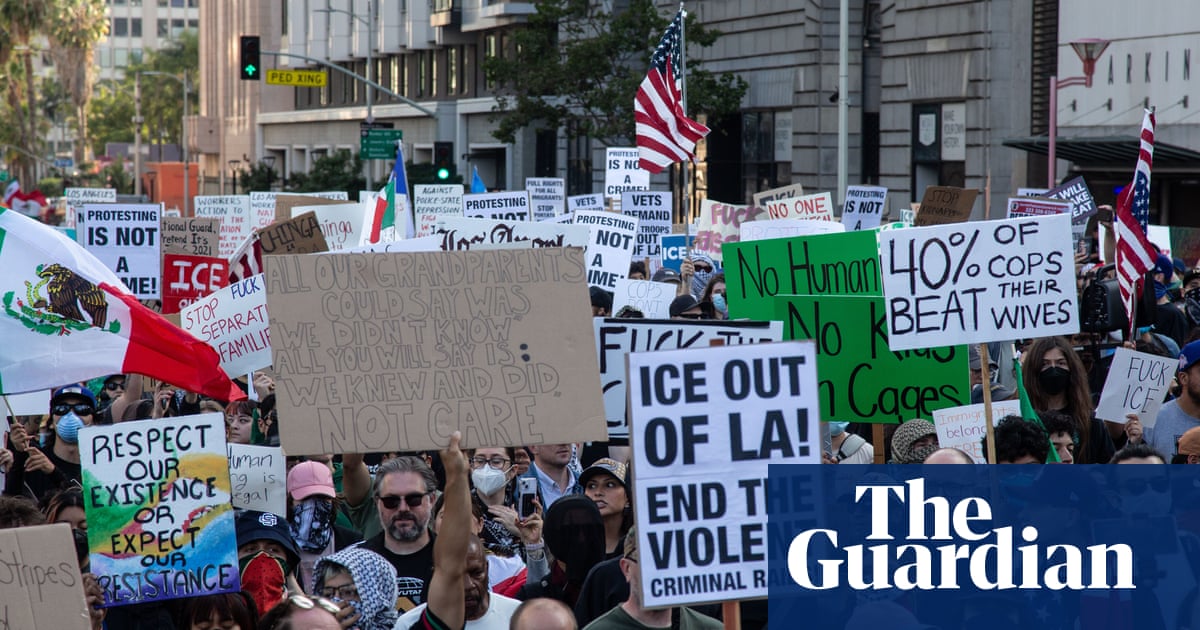TheTrump administrationdeportation campaign is reportedly shifting its focus away from raids on the agricultural and hospitality sectors after Donald Trump conceded this week that his immigration policies are hurting the farming and hotel industries.
The New York Times reportedthat an internal email was sent on Thursday by Tatum King, a senior official with Immigration and Customs Enforcement (Ice), to regional department leaders at Homeland Security Investigations, directing them to stop workplace immigration enforcement actions unless related to criminal investigations.
“Effective today, please hold on all work site enforcement investigations/operations on agriculture (including aquaculture and meat packing plants), restaurants and operating hotels,” King wrote in the guidance, according to the outlet.
The email explained that investigations involving “human trafficking, money laundering, drug smuggling into these industries are OK”, but added that agents were not to make arrests of “noncriminal collaterals”.
“We will follow the president’s direction and continue to work to get the worst of the worst criminal illegal aliens off of America’s streets,” Tricia McLaughlin, a homeland security department spokesperson, said in a statement to the outlet.
The guidance is a marked shift in emphasis and comes after a week-long protests in Los Angeles over an Ice raid on a garment factory in the city triggered protests when the national guard, and later the marines, were ordered into the city over the objections of California’s governor, Gavin Newsom. Further protests over Ice raids are expected on Saturday.
The modification in guidance comes after Trump said on Thursday that changes to protect certain industries were in the works.
“Our great Farmers and people in the Hotel and Leisure business have been stating that our very aggressive policy on immigration is taking very good, long time workers away from them, with those jobs being almost impossible to replace,”Trump wrote on Truth Social.
“We must protect our Farmers, but get the CRIMINALS OUT OF THE USA. Changes are coming!” he added in the post.
Trump campaigned on a platform of mass deportations of undocumented migrants with criminal records or histories, but that expanded in recent weeks as Ice came under White House pressure to increase its daily quota of arrests to 3,000 and the policy appeared to shift to arresting undocumented immigrants with no criminal records.
That potentially affected tens of thousands of workers embedded in the agriculture, construction and hospitality sectors and raised the politically indigestible specter of family separations.
The elevated arrest targets were publicly promoted by Stephen Miller, the White House deputy chief of staff, who reportedly told Ice officials in late May they needed to “just go out there and arrest illegal aliens”.
In the new Ice guidance,later confirmed by the Wall Street Journal,King appeared to acknowledge that the Miller’s quota targets would be affected. “We acknowledge that by taking this off the table, that we are eliminating a significant # of potential targets,” he wrote.
Trump was reportedly warned by his agriculture secretary, Brooke Rollins, that farmers – a key Republican-supporting constituency – were concerned that Ice enforcement would affect their businesses.
The Wall Street Journal reported last weekthat businesses were being hurt because sweeps of non-criminal foreign workers were driving changes in shopping behavior. The outlet cited a 3% drop in Coca-Cola’s sales volume over the first three months of the year, in part because of a pullback by Hispanic shoppers.
Colgate-Palmolive, Modelo brewer Constellation Brands, and restaurant chains including Wingstop and El Pollo Loco have also said that decreased spending by Hispanic consumers had hurt sales.
“We have seen a huge decline in traffic,” Régis Schultz, CEO of JD Sports, the parent company of the Hispanic-targeting Shoe Palace retail chain, told analysts in May. “You can see definitively the impact” of the immigration policy, he added.
